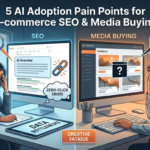Due to the Coronavirus lock down, many businesses have had to shut down indefinitely — and some even permanently.
It is clear, by now, that the pandemic has fundamentally shift how businesses are conducted across every industry. It is important for businesses spending money in PPC to adjust their ppc approach in crisis situations we face today.
Even those that have managed to stay operational (by a thread) are facing a unprecedented uncertainty as they try to keep things moving in the right direction.
Companies that are managing to hang on have limited choices:
- Adapt to the new way of conducting business, survive, and potentially recover
- Fall behind because they have not figured out how to adapt and navigate this new terrain
Unfortunately, many businesses fall into the second group — especially when it comes to their PPC advertising budgets. Spending across the board have decreased, weakening ad revenue as countries aggressively take actions to slow down the spread of the Coronavirus. As a result, Google and Facebook could lose over $40 billion in ad generated revenue.
In spite of everything, the way you adjust your ppc approach in crisis can put you in good shape when we come out of it.
I will share a few ways to crisis-proof your PPC marketing in this article.
Let’s dive in.
Adjusting PPC approach in crisis?
Average cost per click have decreased around 20% – 30% on average. That alone is a great opportunity for businesses to invest more in PPC advertising — with some adjustments, of course.
It is absolutely not crazy to engage with PPC campaigns during crisis, if the returns continue to justify the spend.
But with all trends declining, you would think it is crazy to even think about spending more money on PPC ads right? A 30,000 foot level view appears that ad buying has plunged and it would be wise to scale back.
Now is not the time to conduct PPC campaigns “as usual.” No sirree.
Have you considered adjusting your PPC approach in crisis? The right move, and profitable one, could be to take a closer look
Besides the obvious, many industries are actually thriving in terms of their PPC performance.
At Fullmoon, we are seeing traffic and sales increase by an average of 60% for our clients. But we have made significant adjustments in how we target audiences, ad copy, and a few other tactics that have allowed us to continue delivering positive results.

I’ll share a few changes to the PPC approach we made in crisis with you.
PPC approach in crisis: Adjustments we made for our clients
These adjustments are working for our clients in crisis. So hopefully you will find one or more to help you with your ppc approach in crisis.
#1. Refine your messaging. This is CRITICAL!
Crisis or not, you should be constant refining your ad messaging. But especially in times of crisis, your message must shift towards being more sensitive and empathetic.
It is a fine line to walk. There are marketers who are taking complete advantage of the crisis and playing on the fear of businesses and customers alike.
If your messaging is even slightly offensive, you’re guaranteed backlash on your ad and your brand. Conventional wisdom won’t help you here. You need to use your heart and follow it’s guidance.
Your brand’s value is going to play a big role in crisis or not. Your survival, in crisis, depends largely on how connected your brand is with your audience. Try to direct sale and push your product too hard and you’ll lose the respect and love from your audience.
The business objective is to align your product or services to the climate. Adjusting your ppc approach in crisis is not easy — you have to be mindful of everything that’s going on and keep check on the pulse of your audience.
FMDM made the following adjustments for our clients and have seen positive results:
- rewrite ad copy to reflect in-home delivery instead of shopping at the stores
- using Google Ads ads extensions to reinforce brands’ value proposition in time of crisis
- online offers to align with economic slowdown
#2. Build relationships with your audience
This is probably over-talked about by now. You know relationships with your audience is important. Unfortunately it’s still something that businesses struggle with.
It’s evident, in times of crisis, many people will slowdown their spending activities. People who lost their sources of income will not be looking to buy anything — on sale or not. There’s little point for your PPC ad copy to continue asking for the sale.
Instead, pivot your PPC ads to reinforce your brand. Brand awareness will be an invaluable asset when the crisis is over. Use this time to build trust with your existing audience and establish connection with new audiences.
Remember, the objective is not always about making the sale, especially when people are experiencing financial hardship.
What Fullmoon has done to help our clients build relationships with their audiences:
- writing PPC ad copy to reinforce commitment to brand’s customers without asking for the sale
- customize messaging to website visitors and new audiences. Talk to both groups differently, but acknowledge their plight and initiate conversations through your ad
People who trust your brand will eventually become paying customers.
#3. Triple-down on adding value
Not selling doesn’t not mean you ignore opportunities to sell. There are still people out there, in time of crisis, who wants to buy from you.
If you audience is interested, then you should be ready to nurture them and exceed their expectations.
Out of sight, out of mind.
Now is not the time to be out of sight. Because when the crisis is over, you’ll be out of your audiences’ mind.
You can build audiences based on the actions taken on your website and behavior they demonstrate. Here are a few examples of audiences you can retarget:
- visits to pages with the highest value without any conversions
- visitors who added products to their cart but didn’t buy
- customers who purchased before, can be retargeted with cross-sells
- blog visitors who have spent time on your content might be interested in buying your products
The above, and more are indicators that someone is at least thinking of making a purchase. Whether they’re reading a blog post, checking out your product, or adding items to their cart, or abandoning at the last minute.
Customize your PPC messaging to reflect your audience’s behavior and experience. Be careful not to be too pushy. Besides that, you should take the opportunity to sell…especially when your audience has shown interest.
#4. CPA is OK. But Focus on ROAS.
Here’s an interesting perspective to adjusting your PPC campaigns during crisis. Staying afloat is good, but thriving is so much better. Right?
Cost of acquisition is a good metric to monitor, but even better during time of crisis is knowing how well your advertising money is working for you.
But here’s what is even better in time of crisis. Your ROAS. You need to make sure that your PPC ad spend is working overtime for your business.
If you’re still focused on cost per acquisition or cost per conversion or cost per lead, you’re in the wrong mindset. Especially during times when things are uncertain.
By focusing our campaigns on ROAS, we are driving great results for our clients, even though CPA has increased by 15% on average ROAS has almost doubled in some cases.
For example, one client’s average CPA before the pandemic was $40 (rounded up).
FMDM has adjusted our client’s ppc approach in crisis by doing the following to focus on ROAS:
- adjusted with the ROAS campaign setting
- pausing all non productive campaigns over the last 30 days
- focused on retargeting audience and fine-tuning audience segments
- paused lowest performing ad, and creating new ads using a combination of messaging from the best ad copy
Focus on keeping costs down while generating as many sales as possible — have the mindset that things to dry up quickly in a crisis.
A change in ROAS might decrease your total sales (in absolute volume), but this approach will give you a better chance of survival while still making PPC a viable marketing channel for your business.
#5. Increase spend where competition is pulling back
Your competition will decrease in crisis. And this is your chance, if you have a healthy ad budget, to capitalize and gain serious market share.
With due diligence, your business can assess the landscape and decide what’s best for you. If you have been monitoring your PPC campaign before the crisis, then you’ll have a really good pulse on your competition.
During times of uncertainty, we have seen businesses reduce or pause their PPC spend either because they have made inaccurate assumptions, panic and make bad decisions, or can longer stay afloat.
Whatever the reason may be, a decrease in competition is your opportunity to ramp up your PPC advertising — because customers are still out there looking to buy.
#6. Take Action. Immediately.
Probably the most important adjustment of all. You can’t sit around and wait to see if things get better. It won’t, in the near future.
You need to acknowledge the seriousness of the crisis and take action, immediately!
Every day you wait and hope for a miracle to happen is another day you have lessen your odds of survival. In fact, crisis or not, you should have been taking action immediately to strengthen your market position consistently.
Your ability to execute clearly shows how well you are prepared to position your businesses’ PPC campaign to thrive, even during the worse possible crisis.
There will be winners and losers coming out of every crisis. And the winners are the businesses who are deliberate about their PPC campaign management and those who seek opportunities instead of hunkering down.
PPC Strategy During Crisis
A PPC approach in crisis should include the following:
- Careful evaluation of ROAS over CPA
- generate as much revenue as possible with a healthy return on your ad spend
- pause campaigns that are below your ROAS threshold
- Adjust your PPC messaging to adapt with empathy and value proposition
- Build brand awareness without trying to push the sale
- Look for opportunities to still reach people who are looking to buy
- Focus your PPC targeting to reach audiences with a higher likelihood to become paying customers in the future





